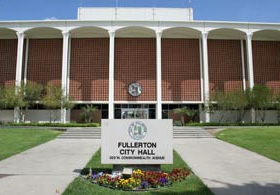
Meanwhile, in the city of Fullerton
Just a thirty minute drive down Highway 91, the city of Fullerton is taking on social media a little differently than Redondo Beach. Joining Facebook a few months before Redondo Beach, the city of Fullerton has since maintained its Facebook page. In fact, it has fully embraced Facebook as a tool to foster citizen engagement. It has 7,232 likes, and posts weekly updates that detail everything from road closures to informal gatherings with the mayor. Fullerton is not blind to the concerns about public records that drove Redondo Beach to quit Facebook. But instead of running from the issue, Fullerton chose to address these concerns head-on by drafting a social media policy. This policy includes appropriate-use guidelines and, importantly, tackles social media records. The social media policy states, “City social media sites are subject
to the California Public Records Act. Any content maintained in a social media format

and communication submitted for posting, may be a public record subject to public
disclosure.” Addressing public records law with regards to for local government social media records, Fullerton’s solution contrasts sharply with Redondo Beach’s.
Evaluating the two cities’ strategies
In today’s world, social media is an important way for citizens to communicate with their local governments. The accessibility social media provides has made city governments more approachable than ever. However, local governments remain apprehensive. This is largely due to public records regulations that require social media interactions to be archived and managed like any other government records. In response, some cities have chosen to go the way of Redondo Beach and abandon social media altogether.This cannot be the solution.
Social media is here to stay. The alternative to abandoning social media is Fullerton’s strategy. Fullerton acknowledged that local government social media records were subject to public records regulation, and it thus adopted a policy that ensured that these records were archived and treated compliantly. As a result, it can better engage with its citizens. Other cities across the U.S., are facing the same dilemma posed by the intersection of social media and public records law. And, in this modern “Tale of Two Cities,” local governments now get to decide which role they play. Do these cities want to be a Redondo Beach? Or, do they want to be a Fullerton? The choice seems easy, and in fact, it is. Embrace social media, and let ArchiveSocial erase any worries about social media public records.

